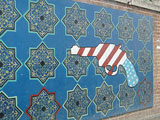US, Iran: Empty threats
By Kamal Nazer Yasin for ISN
The strikes, naturally, fail to materialize as any clear-eyed analysis of the situation could have indicated as early as 2005 - but that of course has not stopped the external page experts and journalists and their readers from fretting desperately over the dire consequences of such a misadventure.
Lately, the Iranians are not even bothering themselves with making counter-threats as was the case with Bush's latest statement on 10 June. As far as the Europeans are concerned, they know by now that the threats are sheer political theater - something along the lines of "if you don't come up with tough sanctions, we'll start another big war in the Middle East." As one EU diplomat told ISN Security Watch recently, the EU "does not take Bush's threats seriously any more."
The Iraqi situation was certainly the defining moment that changed US relations with the Muslim world. In 2004, US war planners could see that once the situation started deteriorating in Iraq, the US simply lacked the wherewithal, and its forces (particularly the Marine Corps and the Army) were too overstretched to open a new front in Iran, a country much bigger and much more difficult to subdue than either Afghanistan or Iraq.
Confined to their barracks in a hostile environment, US troops could have easily turned into sitting targets for Iran-backed Shia insurgents and Iranian missiles right across the border. Considering that the bulk of US supplies come from the southern routes through Kuwait, it is easy to see why war with Iran did not appeal much to US field commanders. Meanwhile, Iran under President Mahmoud Ahmadinejad was adopting a much more assertive foreign policy and increasingly turning into the dominant power in southern Iraq.
Since then, the geopolitical situation has worsened even further. Iran's ally, Hizbollah, has struck a major blow against Israel's image of invincibility and further consolidated itself militarily and politically. Hamas, also allied to Iran, has gained in strength. In the event of war with Iran, both these forces would open new fronts against Israel.
Hizbollah in particular is in possession of Iran-supplied medium-range missiles capable of hitting Tel Aviv. In the last conflict, it pointedly did not deploy these. Would it opt again not to use them?
In addition, Iran and Syria have signed a mutual defense pact that may mean Syria could open a new front from northern Israel if the conflict turned in Iran's favor.
Furthermore, there is the astronomically high price of oil and the precarious state of the world economy that must be taken into account. Oil prices that have broken through the ceiling at US$142 a barrel and would easily double or even triple if the US and Iran were to go to war - even if it were just a "limited strike." (The market is tight and excess capacities are low; in fact, experts believe that the existing excess capacities consist mostly of heavy, low-grade crude oil.)
Three years ago, when both the US and the world economy were in better shape than they are today, a war game simulation undertaken by former top US officials, including former CIA director James Woolsey external page concluded that a recession would be the likely outcome of a similar confrontation.
We get an authoritative insider's view of the White House deliberations on a war with Iran from external page from J Scott Carpenter, former deputy assistant secretary of state, who states that both Defense Department officials and the Joint Chiefs of Staff shot down Dick Cheney's proposal last summer to go after Iran's Revolutionary Guards bases because, according to them, "the Iranians could complicate our lives in Iraq and in the region more than we could complicate theirs."
Finally, there is the issue of a possible Israeli attack on Iran's nuclear sites sometime after the US November elections and before a new president assumes office in January.
A careful look at the current geopolitical situation as well as Israeli domestic politics shows that this is a highly unlikely scenario. First, Israel needs to secure over-flight permits from the US and its allies for such an undertaking. The raid itself would probably go on for two or three days with hundreds of sorties each day and with Israel hitting Iran's air defenses, and command and communication systems also.
As a second-strike capability, Iran is in posession of 50-to-150 conventional medium-range Shahab 3 missiles capable of hitting major Israeli targets including the Dimona nuclear site, which Iran has said would be a likely target if Iran is attacked.
Aside from these, Israel would have to preventively strike Hizbollah, Hamas and even Syrian missile batteries simultaneously as attacked Iran. In other words, this would be a region-wide war.
The questions to ask are ourselves: Is there currently in Israel a strong enough national will for a regional war with such dubious consequences? Is Israel ready to see its strategic relation with the US frayed further after what it has been through thanks to the Lebanese disaster? Can Israel divine who the next president of Iran is going to be; and wouldn't an Israeli strike and the re-election of arch foe Ahmadinejad be a self-fulfilling prophesy?
For those in the left field who look at Bush as some kind of a right-wing zealot who would attack Iran no matter what, perhaps last week's historic agreement with North Korea, another axis of evil country, could calm their quickening pulses.
